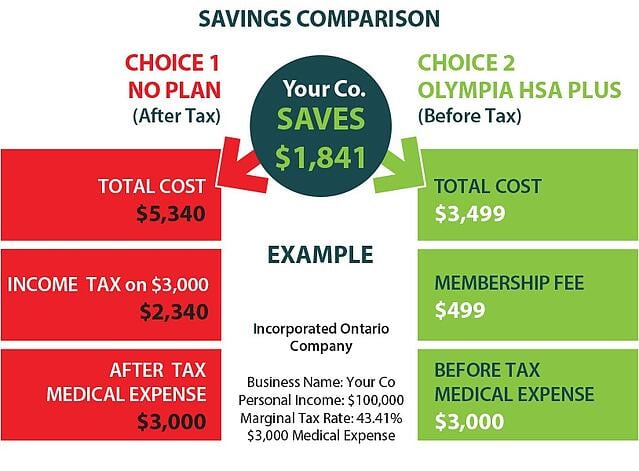Updated: June 28, 2018
A Health Spending Account (HSA) is a cost effective means for a small business owner to pay for personal medical expenses.
When using a Health Spending Account, think of your corporation or business as the employer, and you, the owner (and your spouse, if applicable) as employees.
Here's 5 Health Spending Account tax implications:
1. Tax deductible by the employer
Contributions from the employer to the employee are 100% tax deductible for the employer.
2. Tax free to the employee
Health Spending Account contributions to an employee from an employer are a non taxable benefit.
3. HSA vs METC
Health Spending Account tax implications result in more savings compared to the Medical Expense Tax Credit. With a Health Spending Account:
- Save money beginning with the first dollar
- No minimum threshold
- 100% of expenses are reimbursed
4. After tax vs Before Tax

Choice 1 – Out of Pocket: After Tax Medical Expense
The medical expense could represent a year's worth of uncovered expenses that has been paid for by you, personally, with out of pocket after tax dollars. After tax dollar is the amount remaining after personal income tax is paid. In this example’s tax bracket, the company will distribute $5,340 (before tax), with 43% reserved to pay income tax ($2,340).
To explain in detail, each $1 you spend on medical expenses requires your company to pay you approximately $1.78 before tax. 43% (or 78 cents) is paid in tax to Canada Revenue Agency in the form of provincial and federal taxes.
Choice 2 – HSA: Before Tax Medical Expense
In this case, the medical expense is paid through your corporation as a before tax business expense. Effectively, you are able to write off 100% of your medical expense through your corporation. Value is created by keeping the additional 43% tax inside your corporation.
The cost of the Health Spending Account will vary by provider. In this example the yearly (total) cost of the HSA is $499.
5. Critical Rules and Health Spending Account Tax Implications
There are strict conditions that must be followed to properly establish a Health Spending Account. Ensure the plan design is accordance with CRA guidelines.
Are you a small business owner in Canada with no arm's length employees?
Take a look at our free Beginner's Guide to Health Spending Accounts.
